Ethics and Professional Relationships Case Study: Business Ethics
VerifiedAdded on 2022/09/14
|7
|1672
|21
Case Study
AI Summary
This case study examines the ethical considerations faced by a corporate finance advisor at Crosby, Nash and Stills, tasked with advising Santana Limited on a merger and acquisition deal. The advisor must navigate the complexities of convincing Santana Limited to acquire Double Trouble Limited, a subsidiary experiencing financial difficulties. The analysis applies two ethical theories: Utilitarianism and Deontological ethics, to evaluate the situation and propose strategies. The Utilitarian approach focuses on maximizing benefits for all stakeholders, including Santana Limited and the stakeholders of Double Trouble Limited, advocating for a revised offer and presenting financial reports to justify the investment. The Deontological approach emphasizes the necessity of the merger for the survival of Crosby, Nash and Stills, and the advisor's responsibility to secure a deal that benefits all parties. The paper concludes with a judgment based on the analysis, emphasizing the need for ethical manipulation to secure a beneficial outcome for all parties involved. The document includes references to academic sources supporting the ethical frameworks discussed.
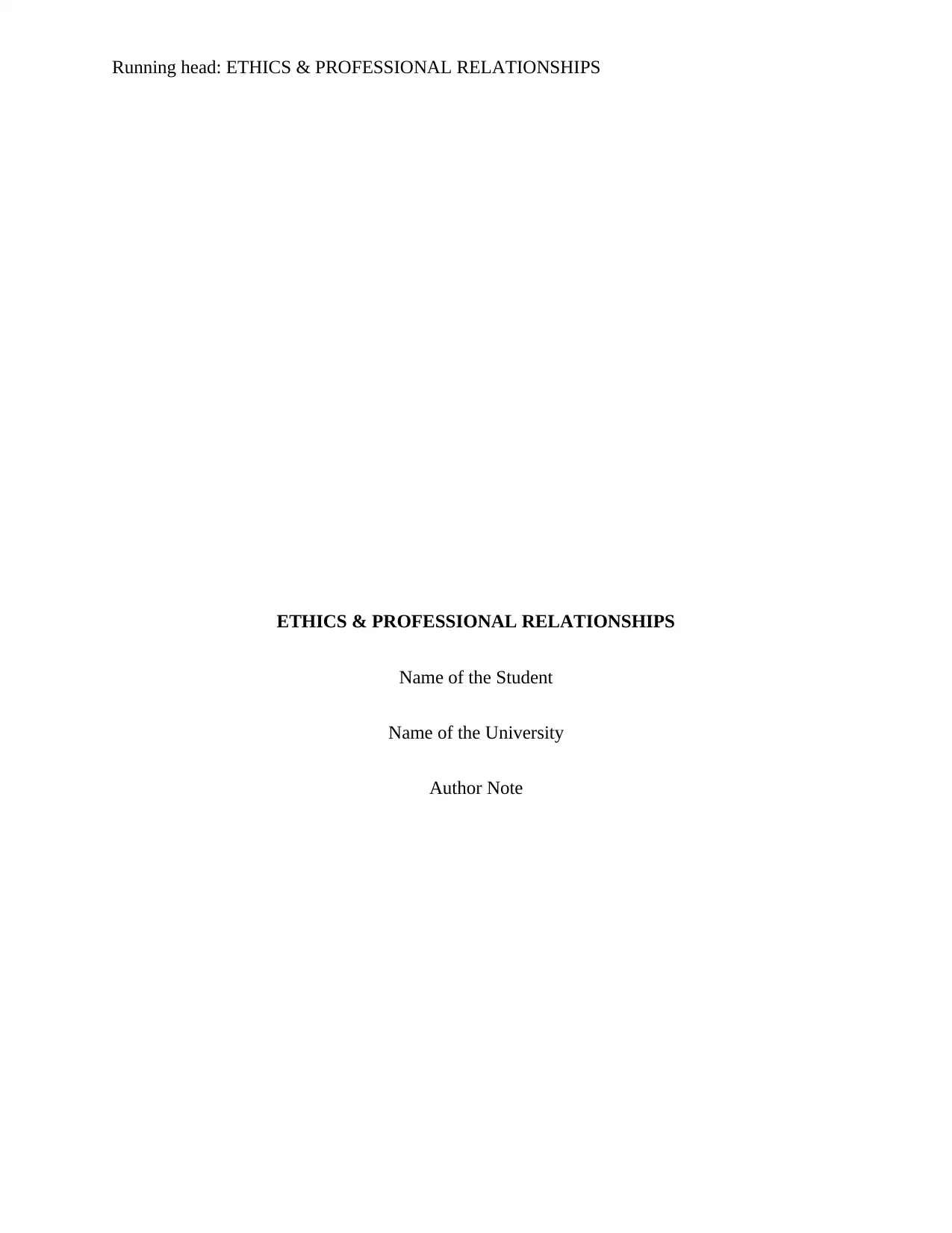
Running head: ETHICS & PROFESSIONAL RELATIONSHIPS
ETHICS & PROFESSIONAL RELATIONSHIPS
Name of the Student
Name of the University
Author Note
ETHICS & PROFESSIONAL RELATIONSHIPS
Name of the Student
Name of the University
Author Note
Paraphrase This Document
Need a fresh take? Get an instant paraphrase of this document with our AI Paraphraser
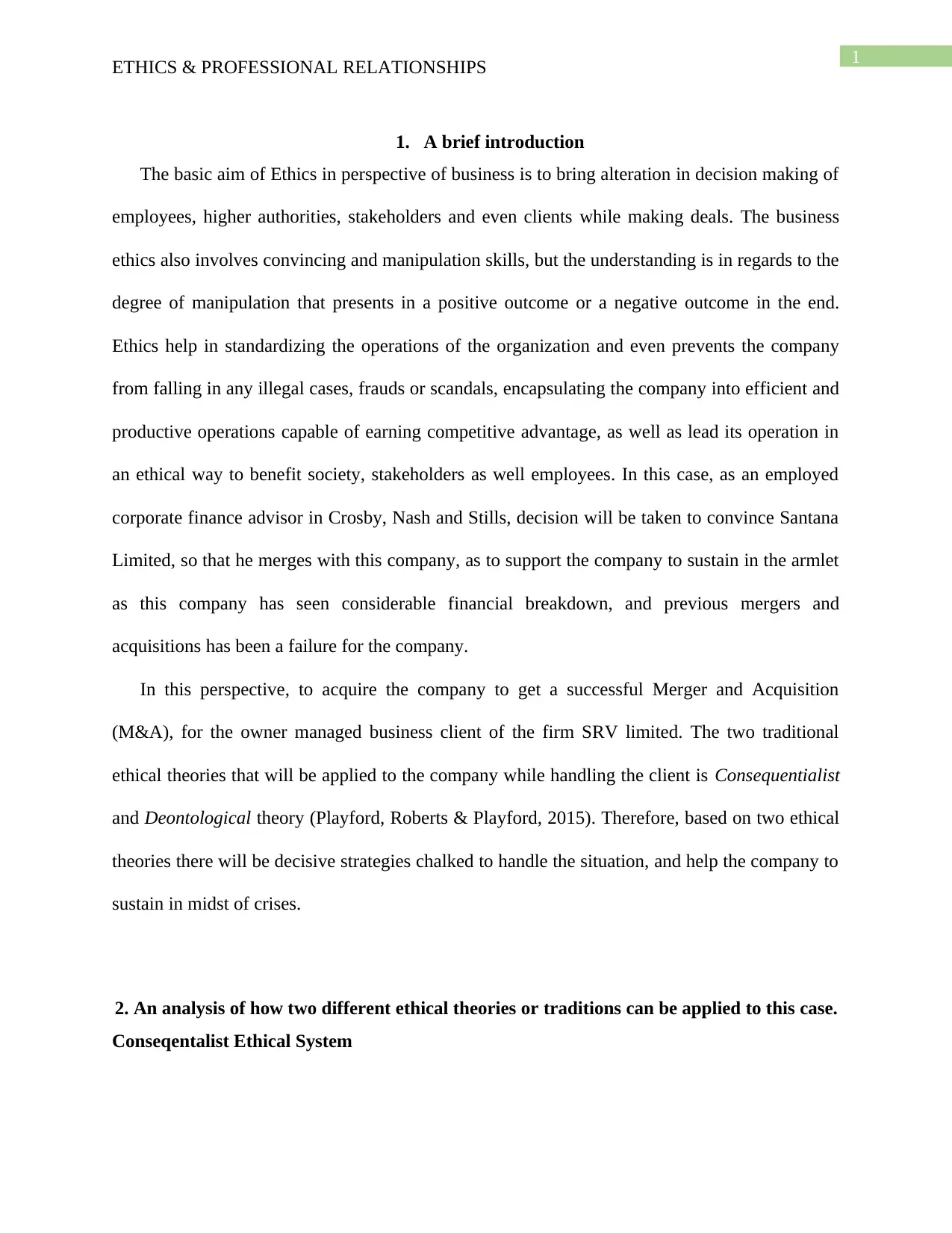
1
ETHICS & PROFESSIONAL RELATIONSHIPS
1. A brief introduction
The basic aim of Ethics in perspective of business is to bring alteration in decision making of
employees, higher authorities, stakeholders and even clients while making deals. The business
ethics also involves convincing and manipulation skills, but the understanding is in regards to the
degree of manipulation that presents in a positive outcome or a negative outcome in the end.
Ethics help in standardizing the operations of the organization and even prevents the company
from falling in any illegal cases, frauds or scandals, encapsulating the company into efficient and
productive operations capable of earning competitive advantage, as well as lead its operation in
an ethical way to benefit society, stakeholders as well employees. In this case, as an employed
corporate finance advisor in Crosby, Nash and Stills, decision will be taken to convince Santana
Limited, so that he merges with this company, as to support the company to sustain in the armlet
as this company has seen considerable financial breakdown, and previous mergers and
acquisitions has been a failure for the company.
In this perspective, to acquire the company to get a successful Merger and Acquisition
(M&A), for the owner managed business client of the firm SRV limited. The two traditional
ethical theories that will be applied to the company while handling the client is Consequentialist
and Deontological theory (Playford, Roberts & Playford, 2015). Therefore, based on two ethical
theories there will be decisive strategies chalked to handle the situation, and help the company to
sustain in midst of crises.
2. An analysis of how two different ethical theories or traditions can be applied to this case.
Conseqentalist Ethical System
ETHICS & PROFESSIONAL RELATIONSHIPS
1. A brief introduction
The basic aim of Ethics in perspective of business is to bring alteration in decision making of
employees, higher authorities, stakeholders and even clients while making deals. The business
ethics also involves convincing and manipulation skills, but the understanding is in regards to the
degree of manipulation that presents in a positive outcome or a negative outcome in the end.
Ethics help in standardizing the operations of the organization and even prevents the company
from falling in any illegal cases, frauds or scandals, encapsulating the company into efficient and
productive operations capable of earning competitive advantage, as well as lead its operation in
an ethical way to benefit society, stakeholders as well employees. In this case, as an employed
corporate finance advisor in Crosby, Nash and Stills, decision will be taken to convince Santana
Limited, so that he merges with this company, as to support the company to sustain in the armlet
as this company has seen considerable financial breakdown, and previous mergers and
acquisitions has been a failure for the company.
In this perspective, to acquire the company to get a successful Merger and Acquisition
(M&A), for the owner managed business client of the firm SRV limited. The two traditional
ethical theories that will be applied to the company while handling the client is Consequentialist
and Deontological theory (Playford, Roberts & Playford, 2015). Therefore, based on two ethical
theories there will be decisive strategies chalked to handle the situation, and help the company to
sustain in midst of crises.
2. An analysis of how two different ethical theories or traditions can be applied to this case.
Conseqentalist Ethical System
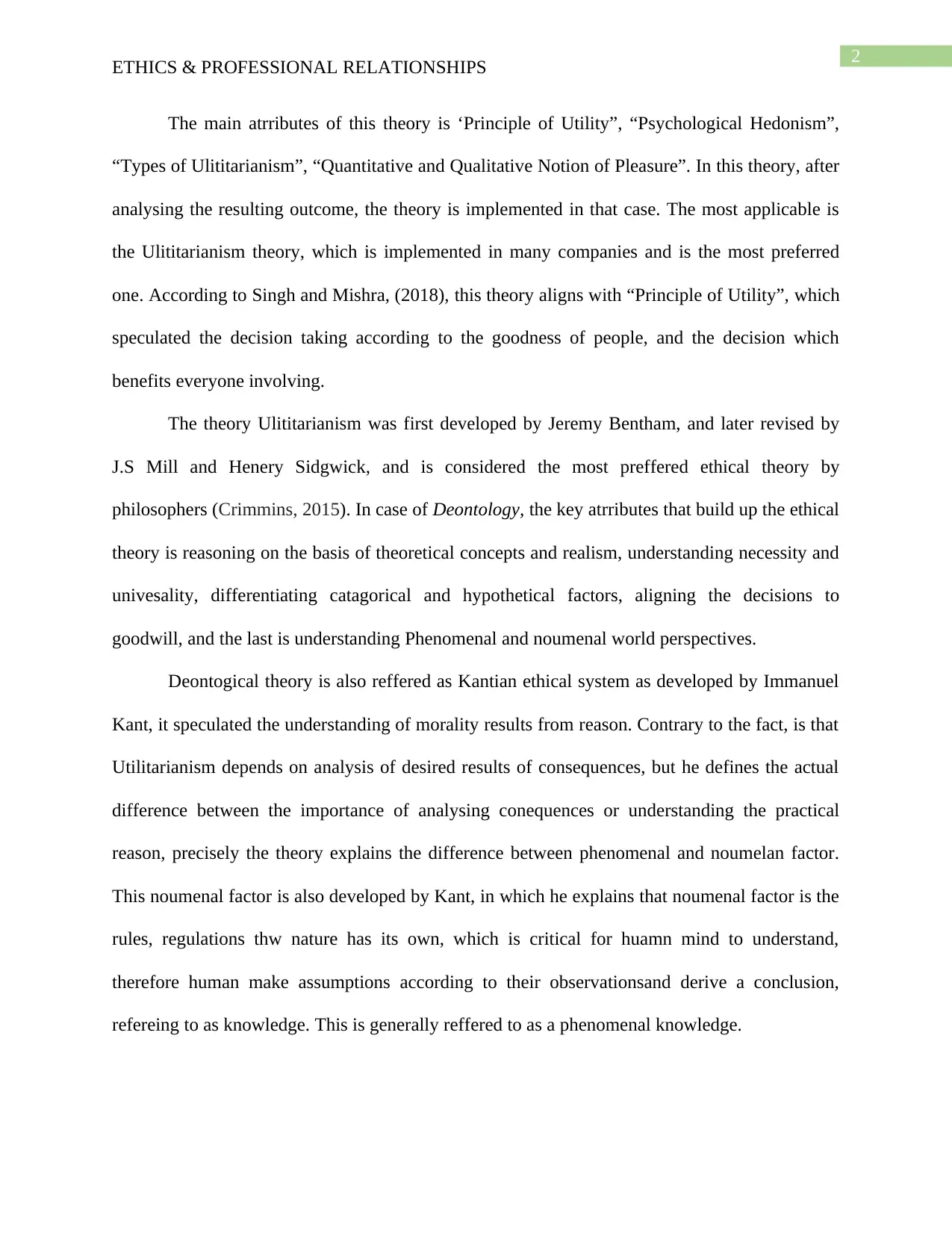
2
ETHICS & PROFESSIONAL RELATIONSHIPS
The main atrributes of this theory is ‘Principle of Utility”, “Psychological Hedonism”,
“Types of Ulititarianism”, “Quantitative and Qualitative Notion of Pleasure”. In this theory, after
analysing the resulting outcome, the theory is implemented in that case. The most applicable is
the Ulititarianism theory, which is implemented in many companies and is the most preferred
one. According to Singh and Mishra, (2018), this theory aligns with “Principle of Utility”, which
speculated the decision taking according to the goodness of people, and the decision which
benefits everyone involving.
The theory Ulititarianism was first developed by Jeremy Bentham, and later revised by
J.S Mill and Henery Sidgwick, and is considered the most preffered ethical theory by
philosophers (Crimmins, 2015). In case of Deontology, the key atrributes that build up the ethical
theory is reasoning on the basis of theoretical concepts and realism, understanding necessity and
univesality, differentiating catagorical and hypothetical factors, aligning the decisions to
goodwill, and the last is understanding Phenomenal and noumenal world perspectives.
Deontogical theory is also reffered as Kantian ethical system as developed by Immanuel
Kant, it speculated the understanding of morality results from reason. Contrary to the fact, is that
Utilitarianism depends on analysis of desired results of consequences, but he defines the actual
difference between the importance of analysing conequences or understanding the practical
reason, precisely the theory explains the difference between phenomenal and noumelan factor.
This noumenal factor is also developed by Kant, in which he explains that noumenal factor is the
rules, regulations thw nature has its own, which is critical for huamn mind to understand,
therefore human make assumptions according to their observationsand derive a conclusion,
refereing to as knowledge. This is generally reffered to as a phenomenal knowledge.
ETHICS & PROFESSIONAL RELATIONSHIPS
The main atrributes of this theory is ‘Principle of Utility”, “Psychological Hedonism”,
“Types of Ulititarianism”, “Quantitative and Qualitative Notion of Pleasure”. In this theory, after
analysing the resulting outcome, the theory is implemented in that case. The most applicable is
the Ulititarianism theory, which is implemented in many companies and is the most preferred
one. According to Singh and Mishra, (2018), this theory aligns with “Principle of Utility”, which
speculated the decision taking according to the goodness of people, and the decision which
benefits everyone involving.
The theory Ulititarianism was first developed by Jeremy Bentham, and later revised by
J.S Mill and Henery Sidgwick, and is considered the most preffered ethical theory by
philosophers (Crimmins, 2015). In case of Deontology, the key atrributes that build up the ethical
theory is reasoning on the basis of theoretical concepts and realism, understanding necessity and
univesality, differentiating catagorical and hypothetical factors, aligning the decisions to
goodwill, and the last is understanding Phenomenal and noumenal world perspectives.
Deontogical theory is also reffered as Kantian ethical system as developed by Immanuel
Kant, it speculated the understanding of morality results from reason. Contrary to the fact, is that
Utilitarianism depends on analysis of desired results of consequences, but he defines the actual
difference between the importance of analysing conequences or understanding the practical
reason, precisely the theory explains the difference between phenomenal and noumelan factor.
This noumenal factor is also developed by Kant, in which he explains that noumenal factor is the
rules, regulations thw nature has its own, which is critical for huamn mind to understand,
therefore human make assumptions according to their observationsand derive a conclusion,
refereing to as knowledge. This is generally reffered to as a phenomenal knowledge.
⊘ This is a preview!⊘
Do you want full access?
Subscribe today to unlock all pages.

Trusted by 1+ million students worldwide
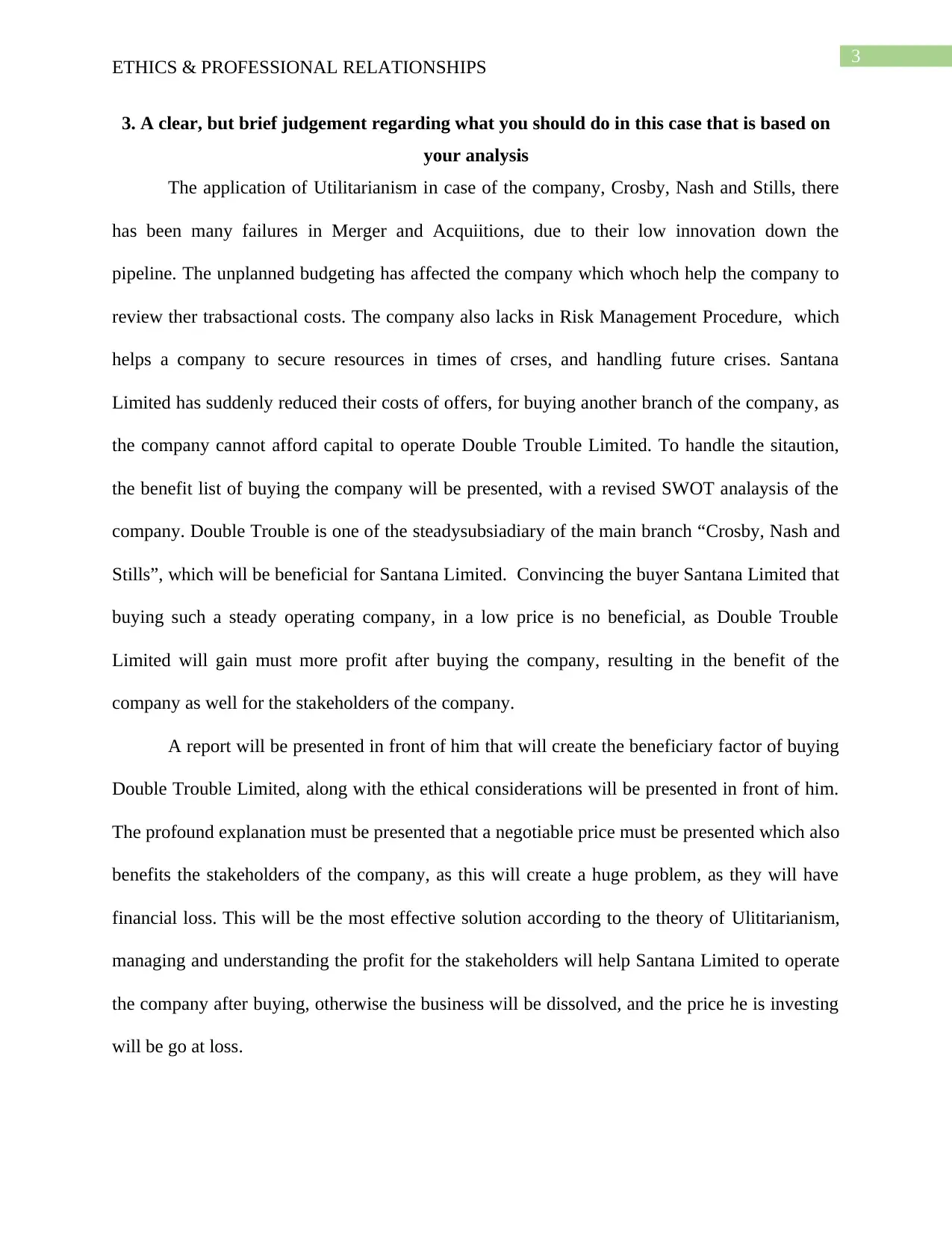
3
ETHICS & PROFESSIONAL RELATIONSHIPS
3. A clear, but brief judgement regarding what you should do in this case that is based on
your analysis
The application of Utilitarianism in case of the company, Crosby, Nash and Stills, there
has been many failures in Merger and Acquiitions, due to their low innovation down the
pipeline. The unplanned budgeting has affected the company which whoch help the company to
review ther trabsactional costs. The company also lacks in Risk Management Procedure, which
helps a company to secure resources in times of crses, and handling future crises. Santana
Limited has suddenly reduced their costs of offers, for buying another branch of the company, as
the company cannot afford capital to operate Double Trouble Limited. To handle the sitaution,
the benefit list of buying the company will be presented, with a revised SWOT analaysis of the
company. Double Trouble is one of the steadysubsiadiary of the main branch “Crosby, Nash and
Stills”, which will be beneficial for Santana Limited. Convincing the buyer Santana Limited that
buying such a steady operating company, in a low price is no beneficial, as Double Trouble
Limited will gain must more profit after buying the company, resulting in the benefit of the
company as well for the stakeholders of the company.
A report will be presented in front of him that will create the beneficiary factor of buying
Double Trouble Limited, along with the ethical considerations will be presented in front of him.
The profound explanation must be presented that a negotiable price must be presented which also
benefits the stakeholders of the company, as this will create a huge problem, as they will have
financial loss. This will be the most effective solution according to the theory of Ulititarianism,
managing and understanding the profit for the stakeholders will help Santana Limited to operate
the company after buying, otherwise the business will be dissolved, and the price he is investing
will be go at loss.
ETHICS & PROFESSIONAL RELATIONSHIPS
3. A clear, but brief judgement regarding what you should do in this case that is based on
your analysis
The application of Utilitarianism in case of the company, Crosby, Nash and Stills, there
has been many failures in Merger and Acquiitions, due to their low innovation down the
pipeline. The unplanned budgeting has affected the company which whoch help the company to
review ther trabsactional costs. The company also lacks in Risk Management Procedure, which
helps a company to secure resources in times of crses, and handling future crises. Santana
Limited has suddenly reduced their costs of offers, for buying another branch of the company, as
the company cannot afford capital to operate Double Trouble Limited. To handle the sitaution,
the benefit list of buying the company will be presented, with a revised SWOT analaysis of the
company. Double Trouble is one of the steadysubsiadiary of the main branch “Crosby, Nash and
Stills”, which will be beneficial for Santana Limited. Convincing the buyer Santana Limited that
buying such a steady operating company, in a low price is no beneficial, as Double Trouble
Limited will gain must more profit after buying the company, resulting in the benefit of the
company as well for the stakeholders of the company.
A report will be presented in front of him that will create the beneficiary factor of buying
Double Trouble Limited, along with the ethical considerations will be presented in front of him.
The profound explanation must be presented that a negotiable price must be presented which also
benefits the stakeholders of the company, as this will create a huge problem, as they will have
financial loss. This will be the most effective solution according to the theory of Ulititarianism,
managing and understanding the profit for the stakeholders will help Santana Limited to operate
the company after buying, otherwise the business will be dissolved, and the price he is investing
will be go at loss.
Paraphrase This Document
Need a fresh take? Get an instant paraphrase of this document with our AI Paraphraser
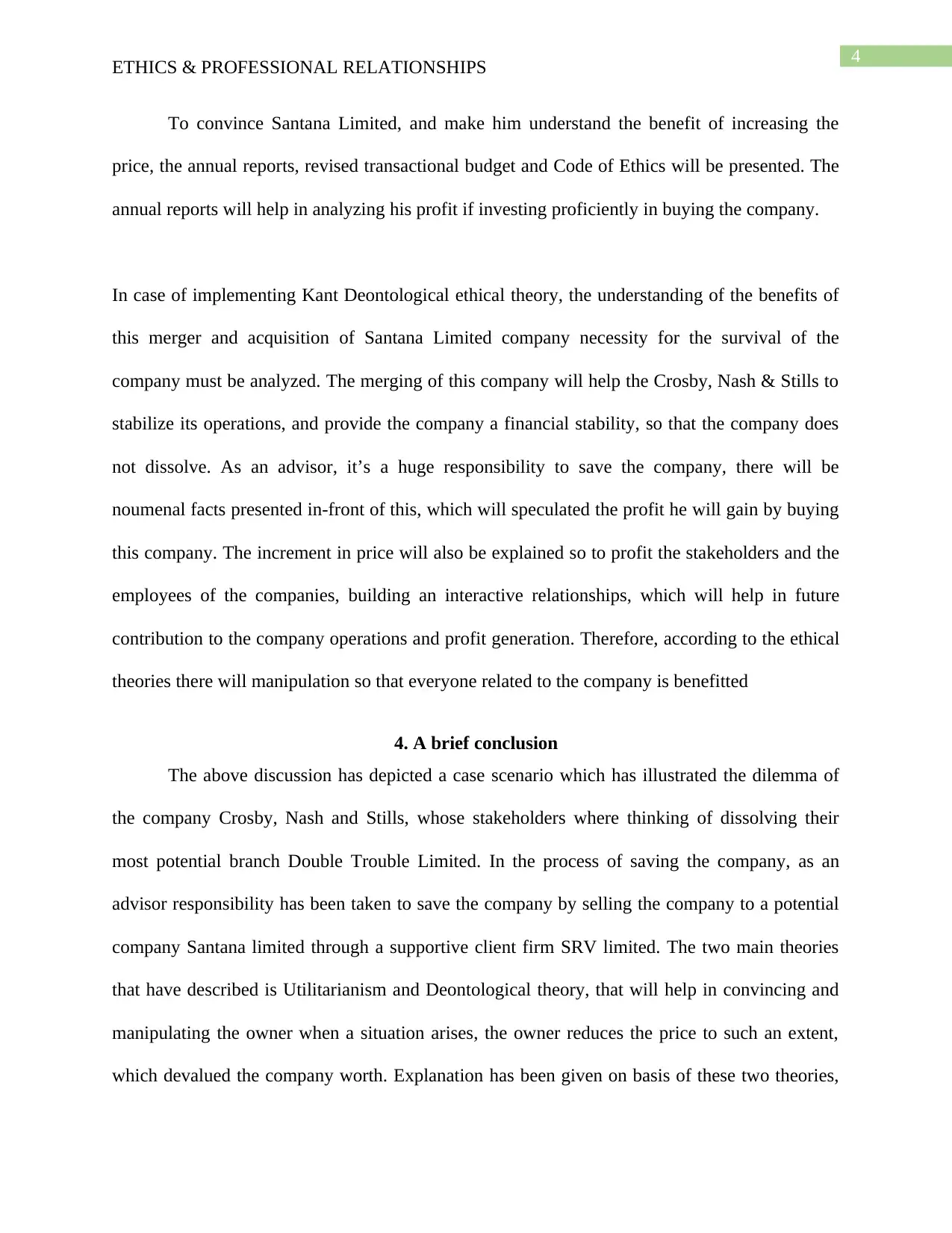
4
ETHICS & PROFESSIONAL RELATIONSHIPS
To convince Santana Limited, and make him understand the benefit of increasing the
price, the annual reports, revised transactional budget and Code of Ethics will be presented. The
annual reports will help in analyzing his profit if investing proficiently in buying the company.
In case of implementing Kant Deontological ethical theory, the understanding of the benefits of
this merger and acquisition of Santana Limited company necessity for the survival of the
company must be analyzed. The merging of this company will help the Crosby, Nash & Stills to
stabilize its operations, and provide the company a financial stability, so that the company does
not dissolve. As an advisor, it’s a huge responsibility to save the company, there will be
noumenal facts presented in-front of this, which will speculated the profit he will gain by buying
this company. The increment in price will also be explained so to profit the stakeholders and the
employees of the companies, building an interactive relationships, which will help in future
contribution to the company operations and profit generation. Therefore, according to the ethical
theories there will manipulation so that everyone related to the company is benefitted
4. A brief conclusion
The above discussion has depicted a case scenario which has illustrated the dilemma of
the company Crosby, Nash and Stills, whose stakeholders where thinking of dissolving their
most potential branch Double Trouble Limited. In the process of saving the company, as an
advisor responsibility has been taken to save the company by selling the company to a potential
company Santana limited through a supportive client firm SRV limited. The two main theories
that have described is Utilitarianism and Deontological theory, that will help in convincing and
manipulating the owner when a situation arises, the owner reduces the price to such an extent,
which devalued the company worth. Explanation has been given on basis of these two theories,
ETHICS & PROFESSIONAL RELATIONSHIPS
To convince Santana Limited, and make him understand the benefit of increasing the
price, the annual reports, revised transactional budget and Code of Ethics will be presented. The
annual reports will help in analyzing his profit if investing proficiently in buying the company.
In case of implementing Kant Deontological ethical theory, the understanding of the benefits of
this merger and acquisition of Santana Limited company necessity for the survival of the
company must be analyzed. The merging of this company will help the Crosby, Nash & Stills to
stabilize its operations, and provide the company a financial stability, so that the company does
not dissolve. As an advisor, it’s a huge responsibility to save the company, there will be
noumenal facts presented in-front of this, which will speculated the profit he will gain by buying
this company. The increment in price will also be explained so to profit the stakeholders and the
employees of the companies, building an interactive relationships, which will help in future
contribution to the company operations and profit generation. Therefore, according to the ethical
theories there will manipulation so that everyone related to the company is benefitted
4. A brief conclusion
The above discussion has depicted a case scenario which has illustrated the dilemma of
the company Crosby, Nash and Stills, whose stakeholders where thinking of dissolving their
most potential branch Double Trouble Limited. In the process of saving the company, as an
advisor responsibility has been taken to save the company by selling the company to a potential
company Santana limited through a supportive client firm SRV limited. The two main theories
that have described is Utilitarianism and Deontological theory, that will help in convincing and
manipulating the owner when a situation arises, the owner reduces the price to such an extent,
which devalued the company worth. Explanation has been given on basis of these two theories,

5
ETHICS & PROFESSIONAL RELATIONSHIPS
which depicts the taking of decisions according to analysis of resulting outcomes and the latter,
by analyzing the reality.
ETHICS & PROFESSIONAL RELATIONSHIPS
which depicts the taking of decisions according to analysis of resulting outcomes and the latter,
by analyzing the reality.
⊘ This is a preview!⊘
Do you want full access?
Subscribe today to unlock all pages.

Trusted by 1+ million students worldwide
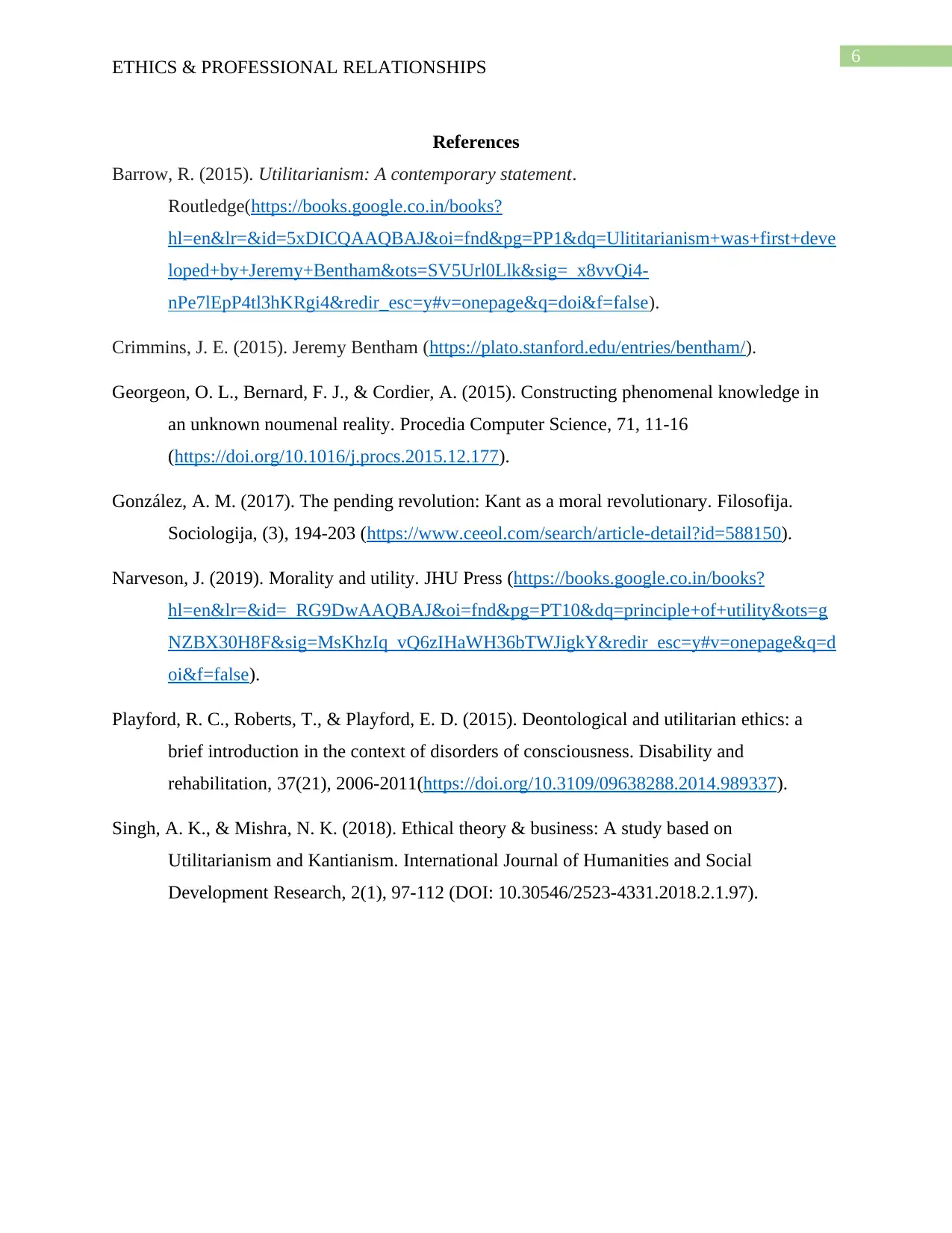
6
ETHICS & PROFESSIONAL RELATIONSHIPS
References
Barrow, R. (2015). Utilitarianism: A contemporary statement.
Routledge(https://books.google.co.in/books?
hl=en&lr=&id=5xDICQAAQBAJ&oi=fnd&pg=PP1&dq=Ulititarianism+was+first+deve
loped+by+Jeremy+Bentham&ots=SV5Url0Llk&sig=_x8vvQi4-
nPe7lEpP4tl3hKRgi4&redir_esc=y#v=onepage&q=doi&f=false).
Crimmins, J. E. (2015). Jeremy Bentham (https://plato.stanford.edu/entries/bentham/).
Georgeon, O. L., Bernard, F. J., & Cordier, A. (2015). Constructing phenomenal knowledge in
an unknown noumenal reality. Procedia Computer Science, 71, 11-16
(https://doi.org/10.1016/j.procs.2015.12.177).
González, A. M. (2017). The pending revolution: Kant as a moral revolutionary. Filosofija.
Sociologija, (3), 194-203 (https://www.ceeol.com/search/article-detail?id=588150).
Narveson, J. (2019). Morality and utility. JHU Press (https://books.google.co.in/books?
hl=en&lr=&id=_RG9DwAAQBAJ&oi=fnd&pg=PT10&dq=principle+of+utility&ots=g
NZBX30H8F&sig=MsKhzIq_vQ6zIHaWH36bTWJigkY&redir_esc=y#v=onepage&q=d
oi&f=false).
Playford, R. C., Roberts, T., & Playford, E. D. (2015). Deontological and utilitarian ethics: a
brief introduction in the context of disorders of consciousness. Disability and
rehabilitation, 37(21), 2006-2011(https://doi.org/10.3109/09638288.2014.989337).
Singh, A. K., & Mishra, N. K. (2018). Ethical theory & business: A study based on
Utilitarianism and Kantianism. International Journal of Humanities and Social
Development Research, 2(1), 97-112 (DOI: 10.30546/2523-4331.2018.2.1.97).
ETHICS & PROFESSIONAL RELATIONSHIPS
References
Barrow, R. (2015). Utilitarianism: A contemporary statement.
Routledge(https://books.google.co.in/books?
hl=en&lr=&id=5xDICQAAQBAJ&oi=fnd&pg=PP1&dq=Ulititarianism+was+first+deve
loped+by+Jeremy+Bentham&ots=SV5Url0Llk&sig=_x8vvQi4-
nPe7lEpP4tl3hKRgi4&redir_esc=y#v=onepage&q=doi&f=false).
Crimmins, J. E. (2015). Jeremy Bentham (https://plato.stanford.edu/entries/bentham/).
Georgeon, O. L., Bernard, F. J., & Cordier, A. (2015). Constructing phenomenal knowledge in
an unknown noumenal reality. Procedia Computer Science, 71, 11-16
(https://doi.org/10.1016/j.procs.2015.12.177).
González, A. M. (2017). The pending revolution: Kant as a moral revolutionary. Filosofija.
Sociologija, (3), 194-203 (https://www.ceeol.com/search/article-detail?id=588150).
Narveson, J. (2019). Morality and utility. JHU Press (https://books.google.co.in/books?
hl=en&lr=&id=_RG9DwAAQBAJ&oi=fnd&pg=PT10&dq=principle+of+utility&ots=g
NZBX30H8F&sig=MsKhzIq_vQ6zIHaWH36bTWJigkY&redir_esc=y#v=onepage&q=d
oi&f=false).
Playford, R. C., Roberts, T., & Playford, E. D. (2015). Deontological and utilitarian ethics: a
brief introduction in the context of disorders of consciousness. Disability and
rehabilitation, 37(21), 2006-2011(https://doi.org/10.3109/09638288.2014.989337).
Singh, A. K., & Mishra, N. K. (2018). Ethical theory & business: A study based on
Utilitarianism and Kantianism. International Journal of Humanities and Social
Development Research, 2(1), 97-112 (DOI: 10.30546/2523-4331.2018.2.1.97).
1 out of 7
Your All-in-One AI-Powered Toolkit for Academic Success.
+13062052269
info@desklib.com
Available 24*7 on WhatsApp / Email
![[object Object]](/_next/static/media/star-bottom.7253800d.svg)
Unlock your academic potential
Copyright © 2020–2025 A2Z Services. All Rights Reserved. Developed and managed by ZUCOL.
